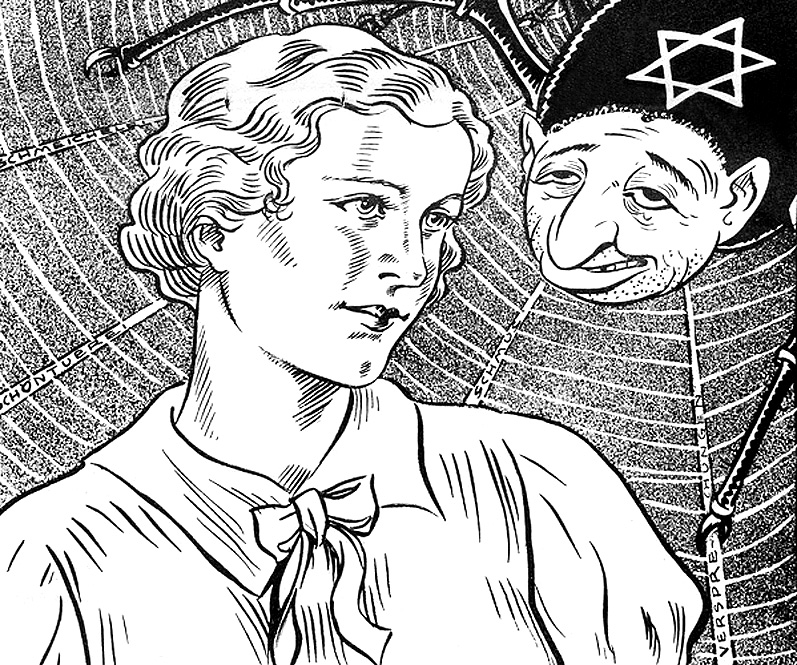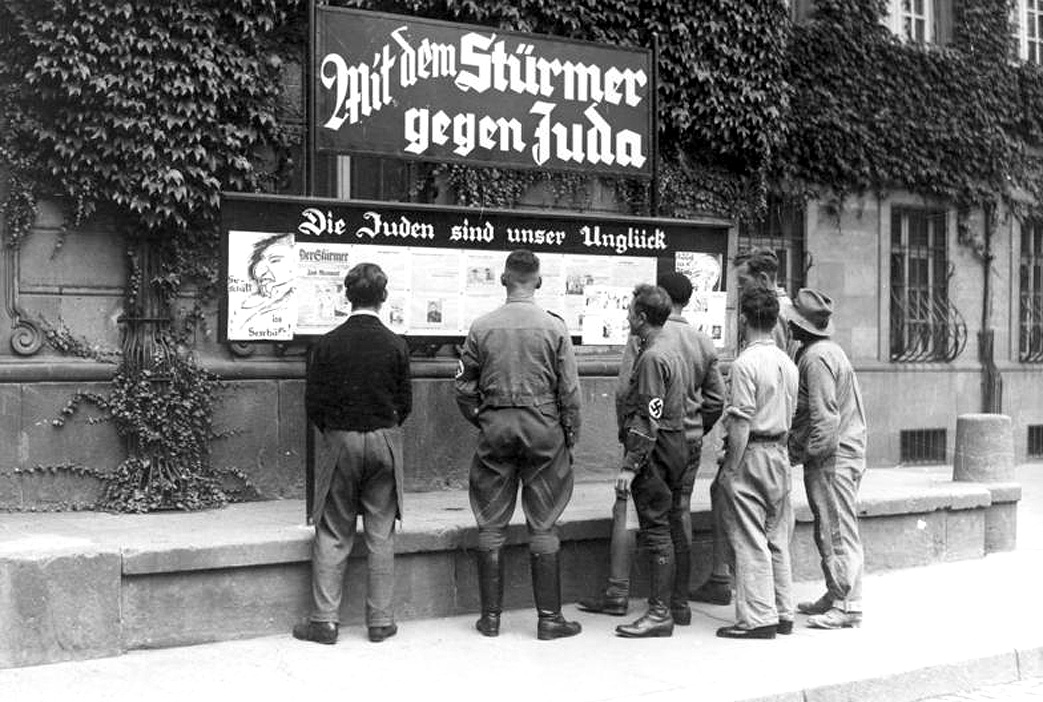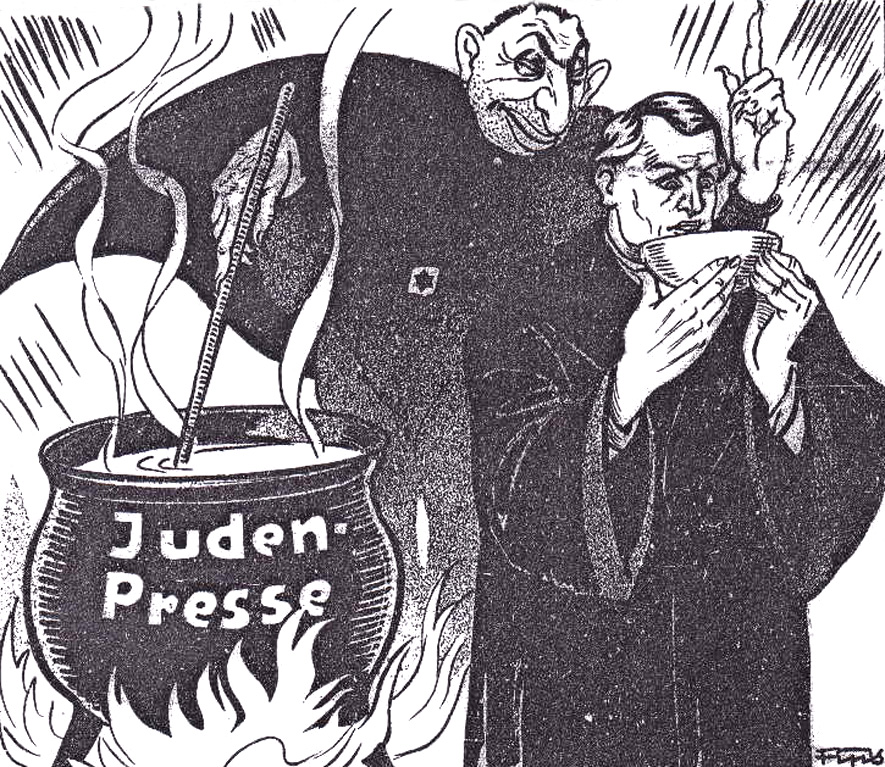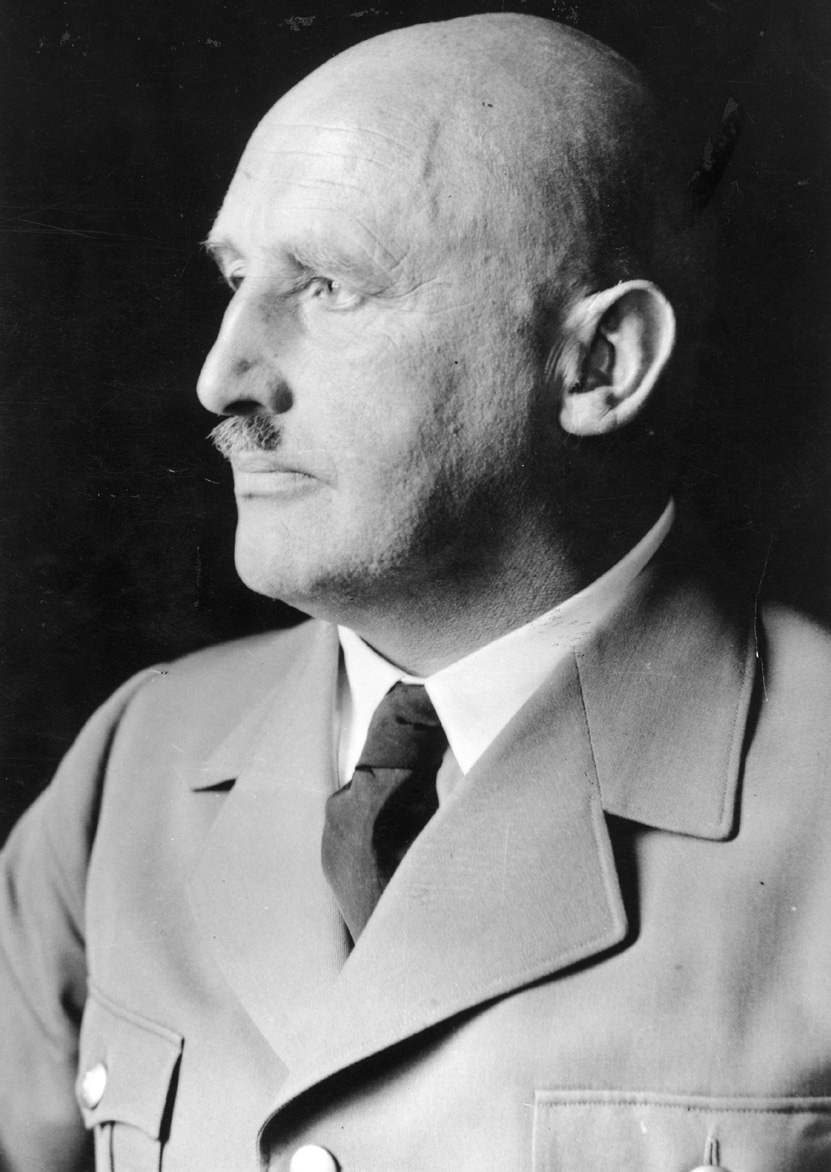
Interview with Erich, print assistant for Der Stürmer, Nuremberg, 1988.

[Above: Die Spinne (The Spider), this art graced the cover of the June 1935 issue of Der Stürmer. The description to the art read:
'Manch opfer blieb im netze hangen/Von Schmeicheltönen eingefangen/Zerreitze das Netz der Heuchelei/Ihr macht die deutsche Jugend frei'
(Many a victim got caught in the net/Caught by flattering tones/Tear apart the net of hypocrisy/You make the German youth free).
You'll also note that some of the web strands contain the words 'Schöntuerei', 'Schmeichelei',
'Versprechungen' and 'Schmus'.
Which basically mean 'flattery', 'fairy tales', 'promises' and 'schmooze'.]
'With pleasure, I say that the Stürmer, more than any other daily or weekly newspaper, has made clear to the people in simple ways the danger of Jewry. Without Julius Streicher and his Stürmer, the importance of a solution to the Jewish question would not be seen to be as critical as it actually is by many citizens. It is therefore to be hoped that those who want to learn the unvarnished truth about the Jewish question will read the Stürmer.'
-Albert Forster, the Gauleiter of Danzig, 1937.

Thanks for letting me speak to you; can I ask you what brought you become part of the paper?
Erich: Yes, you will be the only one hearing this. I was a journalism student and met Philipp Rupprecht [Rupprecht did art for Der Stürmer, drawing literally thousands of Jewish caricatures, among other topics, under the pen-name 'Fips'. He also did art for the 1938 famous children's book 'The Poisonous Mushroom' (Der Giftpilz).-Ed.] who shared the same political ideas I had. He introduced me to Julius Streicher in 1936. I was brought on to the staff and assigned as an assistant to Ernst Heimer [Heimer wrote for Der Stürmer, but also wrote the children's book 'The Poisonous Mushroom' (Der Giftpilz) among other books penned during the Third Reich.-Ed.]. I lived in a district of Nuremberg named Fürth, and it had a Jewish population that was large compared to the city of Nuremberg. I had an interest in history and in particular about the Jews in Europe. Streicher was very happy to meet a young person who was as passionate about this as he was.
I worked at the newspaper firm and spoke on the phone often to Ernst who would ask me to research a topic for him, which he was going to write about. I spent a lot of time in the archives and studying manuscripts relating to the topic of Jews and Christianity. I was also often paid to travel to do research. Der Stürmer was a popular newspaper in Germany, and later in Europe.
Would you consider yourself anti-Jewish?
Erich: Ah, I do not think so, and let me explain this. I love my people first and foremost and want to protect them by telling the truth. It does not mean I hate them because I tell the truth; we must always love our own first, but not hate. We hated what was happening to our people and this lead us to the Jews who were behind this.
I, like many Germans could see something was not quite right with this group. They were a very tiny minority in this country, but they held most all of the power and wealth, cleverly hiding behind a mask, so to speak. They projected the image that they were poor, powerless, and accepting of all ideas. Their actions were very different, however.
They tried to act and look German as best they could, but their features always gave them up. They would not completely fit in, and many worked to be unseen while destroying our culture. They became bolder and bolder while demanding the removal of our culture. Christianity came under attack as well as the church. It is said they infiltrated the Church to bring it down from the inside. Some priests were removed as they could not prove they were Aryan, and had all the markings of a Jew. They just happened to be the ones promoting race destruction and homosexuality to their flock.
By the late 1920s you could not escape Jewish influence in the big cities. They were the film directors, bankers, lawyers, brokers, and any other wealthy trade. The reason I knew this is because my father fell in the first war, my mother died in 1919 due to the English blockade, which made many malnourished and sick, so my Grandparents raised me. My Grandfather was very versed in the Jew, and taught me how to see them; this was common in Europe for this time, they could not hide deeply enough.
He taught me to look for the dark eyes and hooked nose, the skin tone, the beady eyes, the rat ears, and the names that they had taken. Jews are easy to pick out as they show racial characteristics; they try to intermarry to change this, but the features come out. Therefore, I could see in the papers that Jews were heavily overrepresented in Germany.
Even the pimps, criminals, and molesters were heavily Jewish. It was so bad that in Berlin they installed a Jewish police chief to downplay and hide the crimes they committed. He worked tirelessly to strangle the National Socialists in Berlin, and then fled the country when the game was up. I was aware of this problem, but I never hated the Jews, I was dedicated to exposing their hypocrisy and the secret war some waged on our people.
What do you remember about Julius Streicher?
Erich: He was a good boss, very friendly and slow to anger. I made many mistakes early on and he and Ernst were very forgiving and were great teachers. There is much said today about Streicher, the Allies had special people who went around Europe looking for any tidbits on him. As you know, he was martyred on the gallows. Just think of it. He was a private business owner running a legal newspaper, and the victors were able to kill him for just printing his mind. The hypocrisy of the victors is truly astounding.
Streicher was very popular and was invited to many parties and dinners, especially since he was part of the old guard and a holder of the Blood Order. He often spoke of the rich and famous he knew and even in foreign lands how racially aware people were. His wife would often bring in treats for us, his sons worked at the paper also doing stories or typesetting. We had a girl who started named Adele, who was made his personal secretary, and taken to the farm to stay with him later in the war.
He would always give us bonuses at Christmas, and made sure all our needs were met. I once remember a time when I was on my way to the firm with some examples of Ernst's articles, when trying to get on a tram I dropped the folder and spilled the contents. The driver yelled at me and berated me as I was holding him up. I thought it rude and bad form, I was upset when I came into the door. He asked what was up my arse, I told him all about it. He called his office and demanded to have the head of the tram company call him. Ten minutes later he called, and was told to refresh the driver on manners.
I really have nothing bad to say about the man, it is said today many in the party did not like him. He had his faults, and due to being popular had many rumors spread about him. I have always wondered if powerful Jews, who still had the ears of some party officials, planted them. He was a very good boss. I remember also he had prisoners work on his farm, Adele told me he got in trouble because he allowed them freedom. One was from France and he allowed him a pass to go home to visit his mother who was sick.
Streicher made sure she had good care and let him go whenever he needed. He provided passes for what he called his staff, to take trips. One was to Rothenberg to an old monastery to get a special beer. There, one ran into an observant police officer who was upset that prisoners were running around like on holiday. He was chastised for this, but paid no attention as he was not cruel. They would come to the paper sometimes to clean and do maintenance, and we would eat lunch with them. A couple of the girls were paid workers from the east and well liked.

[Above: Germans at a public display of Der Stürmer in Worms, Germany, 1935. The billboard reads 'Mit dem Stürmer gegen Juda'' (With the Stürmer Against Judah). Below it is the slogan of the newspaper: 'Die Juden sind unser Unglück' (The Jews are Our Misfortune).]
You mentioned that party officials did not care for him, which I have heard too. Can you speak about this?
Erich: Yes, as you know he got into some trouble by bringing to light misdeeds he saw others do. However he lived in a glass house so as he went after wrong-doers in the government, they went after him. I remember during the riots of November 1938 [The so-called 'Kristallnacht'.-Ed.] he applauded the attacks, saying it was justified indignation. He later accused others of promoting the rioting, which damaged Germany's image, then they conveniently pointed out he had cheered them on. His sons were embarrassed by this.
He also had a row with Reichsminister Göring I have heard. Göring was a wealthy aristocrat who had many Jewish friends and did not care to see them called out. He attacked Streicher, and those attacks were returned. Göring was always at the front of the line to see new things in the Reich, and he went to a hospital trade show, when Streicher suggested he had his daughter through unnatural ways due to new technology he saw. This infuriated Göring who tried to get the paper closed.
He also had a bad habit of stepping into disputes between people and used his position to enforce his opinion, which would sometimes make both parties mad at him for getting involved. Because of these issues, he was let go from a leading position in the party, and tasked with running the paper. He was more withdrawn after this and when his wife died in 1943 he stayed on his farm. He then leaned on Adele more and more, who did not mind as she was a very caring person and her character was to heal the hurt.
I have always wondered about Kristallnacht, what do you remember and did Streicher support it?
Erich: Yes and no. At first he applauded the riots saying he hated what the Jews had done but also didn't want bad press for Hitler and National Socialism. He blamed laziness among party officials who did not work fast enough to stop it. Here in Nuremberg Jewish synagogues were set on fire, as were a few Jewish businesses, and Jews who came out to fight the mob were attacked, some were killed. I want to tell you how this started, however, as there is much more than meets the eye. Since the beginning of the NSDAP, a tactic that its enemies used was to kill those who were easy targets. There was a large book of martyrs kept in Munich to prove this. Once the Führer was elected Jews in other nations declared war and started killing our officials, this happened more than the papers would like to admit. Even in Germany, there were assassinations in 1933, even though Hitler tried to work out solutions with the Zionists.
The final straw came in November 1938 when Rath [Ernst Eduard vom Rath was a German diplomat who was murdered in France by a Jew.-Ed.] was killed, and he was famous so it angered many. The press tried to not make a big deal about it, but the act could not be downplayed, as his killer was yet again a Jew. This happened on one of the most sacred days for the party. Many students, current and former SA men, and civilians started to rise up and attack anything Jewish. Jews were later arrested for anti-Hitler graffiti. They would paint in the street or on walls, so they were forced to clean up the mess, now they parade the photos as proof of persecution.
I can confirm that I saw the mob of people here in Nuremberg that were milling about. They are said to have become enraged the more they milled around. I looked out of my window later and saw smoke coming from the synagogue so I knew they set it on fire. I could hear the fire brigade coming but they could not do much.
Streicher called us to the firm to run articles about this, but he was also angry at this show of blind rage. He felt a more meticulous and disciplined action was needed to get Jews to start leaving. I know he ordered a synagogue torn down; I believe it violated zoning codes or something like that. He used this as an example of breaking their power. Jews in Germany were seeing righteous anger over Jewish terrorists, and who could forget their defense of Marxism?
In your country, the Japanese citizens endured hate over an event they did not cause. It just shows how collective guilt dogs humans. Some on the staff did not discern between the two, his sons especially pushed articles detailing the complete removal of all Jews from the Reich and all Christian lands. To some there was no "good Jew" and they all must be forced to return from the lands they came from.

[Above: The Jew brews up his lies that the sheep readily injest. 'Juden-Presse' (Jewish Press).]
Seeing all of this, do you believe the Holocaust happened, and do you feel responsible?
Erich: We must be careful with this question as it is not possible to openly speak of this. I will tell you I knew nothing about what was happening in the camps. Streicher never mentioned it, and all we discussed was a desire to see Jews removed back to the east from where they came from. I know Jews were removed from all over Europe, that could not be hidden, and all we were told is they were being sent east to be resettled. Again not all Jews were removed; if they served the Reich or were nonpolitical, or married to a Christian, they were left alone.
From speaking with people after the war who were involved with this, the plan was to move Jews into Russia and have them resettled. I had a friend who worked in the SS office that ran this; he even said many were paid to move to Palestine. The wealthy ones who were sought as usurpers and thieves left for America and Britain, agitating against Hitler from the safety of their new homes. I feel no remorse for anything, we told the truth about the history of these people as best we could.
They came to our county, built up huge wealth, and then waged war on us by forcing their ways on us. Anytime there was a meeting to limit rights or give some obscure group special privileges, Jews were always behind it. They fought for perversion of the sexes and seduced married women, using them and then discarding them like an old rag. During the Weimar era, which has been called the Jewish era, suicides soared as women were put on drugs, used for sex, abused and sold and the men were powerless to stop it, as harsh laws made speaking against the Jews a crime.
Almost every time it was a Jewish face or name who was behind crimes like smuggling, drugs, organized crime, sadistic sex, homosexuality, child pornography, fraud, bribery, and extortion. They loved insurance fraud especially. This was a very tiny minority, yet committed the vast majority of these acts. I understood the anger people had when they could see this, and I was glad to help wake up more people to this danger. I never would wish what happened to them on anyone, but their hateful leaders caused it to happen by inciting war, which Jewish financiers have been very good at through history. They waged a holy war on us and won.
It angers me that this people came to us, fed off us, used us, and when we punished them for it and exposed them, they started a war to destroy what they hated. They then caused the deaths of thousands of their people, and then blamed us by making up stories of killing factories and mass murder. This is how they get their revenge on us, and they used our own racial kin to do it.
What happened to you during the war?
Erich: I worked for the paper until the end. It was such a good job with lots of benefits. I was exempted from wartime service, as I had a heart murmur. I stayed in Fürth, which was spared serious bombing since many Jews still lived there. We received damage in 1940 and a few more raids during the war hit the airfield and factories nearby. It did not get bad until 1944 when the Allies hit anything and everything they could.
The working conditions were very good for me, once an edition was finished we were given time off to go relax. I met a pretty secretary and started a relationship in 1940, we married in 1943, and Streicher sent us on a honeymoon to Biarritz [A French resort town, about 15 miles up the Atlantic coast from the border with Spain.-Ed.] for two weeks. This included money for food and extras and we were very grateful.
My wife's brother served in a flak battery here in Nuremberg. We could hear his guns firing nonstop during the air raids. Nuremberg would regularly have alarms going off which disrupted our work quite often, and sometimes caused unneeded deaths as people started to dismiss the alarms as not pertaining to us. As the end drew near, we stopped production I believe in early '45, and fled to Haroldsburg to stay with a friend. Streicher wished us well and I remember him being very fatalistic, saying for him it was over and he would meet the enemy.
This was the last time I saw him, he was with his sons, Adele, and one of the Ukrainian women heading back to the farm. For us it was over also. The Allies forced everyone to prove what they did during the war. I showed my exempt certificate and told them I lost my other documents in the bombings, and that I was a lowly printer. I had no desire to go to one of the Allied camps. I read there were problems later with Jewish guards beating Germans, and all sorts of revenge.
I was disgusted by the tribunals and saw them as the farce they were. Germany was given more martyrs for the future of our beliefs. Someday the world will know they died innocent and were victims of Jewish hate.

[Above: Julius Streicher. The Legend. Murdered by Allied execution for speech crimes, much like the French hero Robert Brasillach. Amongst Streicher's final defiant words were 'The Bolsheviks will hang you one day!']
Back to Interviews







